|
|
|
Sort Order |
|
|
|
Items / Page
|
|
|
|
|
|
|
| Srl | Item |
| 1 |
ID:
086953


|
|
|
|
|
| Publication |
2009.
|
| Summary/Abstract |
Current public policy debates on energy security are characterized by a singular focus on questions regarding access to resources. This lopsided attention to the geopolitical dimension of energy security is based on the myopic and erroneous presumption that global energy politics is necessarily a zero-sum game in which one country's energy security is another's lack thereof. In fact, debates deflect attention from the real issues that policy-makers should consider in their attempts to foster effective global energy governance-the central role increasingly international energy markets play in balancing demand and supply-and, even more importantly, the significance of the 'rules of the game' that structure these markets. This article makes a first attempt to apply a broader analytical lens by pointing out and analyzing the important role rules play in determining outcomes in international oil and gas markets; by examining how current trends are affecting the existing 'rules of the game'; and by highlighting consequences for public policy.
|
|
|
|
|
|
|
|
|
|
|
|
|
|
|
|
| 2 |
ID:
102347
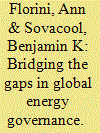

|
|
|
|
|
| Publication |
2011.
|
| Summary/Abstract |
Energy constitutes a rich, but underexplored, arena for global governance
scholars and policymakers. The world is currently on an unsustainable and
conflict-prone track of volatile and unreliable supply of energy fuels, vulnerable
infrastructure, massive environmental degradation, and failure to
deliver energy services to an enormous proportion of the global population.
Changing to a different path will be a monumental global governance
endeavor that will require bridging multiple issue areas, regimes,
and policy silos. Meeting that challenge will require a greatly expanded research
agenda aimed at understanding the institutions, interests, and concerns
that do and could shape global energy governance. In this article, we
lay out key energy-related global issues and explore some of the connections
among them to suggest an initial research agenda for global governance
scholars.
|
|
|
|
|
|
|
|
|
|
|
|
|
|
|
|
| 3 |
ID:
152749
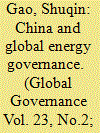

|
|
|
|
|
| Summary/Abstract |
China has been pursuing a risk averse counterweight energy strategy, cultivating strategic energy allies and diversifying its energy sources, generating a power shift of energy distribution from international oil companies to national oil companies. China's neomercantilism and NOCs suggest neither integration into the US-led international energy regime nor confrontation with the Organisation for Economic Co-operation and Development–centered global energy governance. Instead, China is working toward creating a China-led alternative competitive regime. The prospect is therefore the emergence of a more fragmented and multilayered global energy governance.
|
|
|
|
|
|
|
|
|
|
|
|
|
|
|
|
| 4 |
ID:
143612
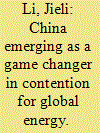

|
|
|
|
|
| Summary/Abstract |
China’s rise as a global power features its unyielding contention with the West for domination in the world system. Such contention manifests itself conspicuously in the control of global energy governance as China has a more urgent need to secure its energy supply to sustain its economic growth. Viewed in a historical perspective, in the arena of global energy politics and markets, China has incrementally evolved through the stages of development from starting as a passive rule-conformist to later becoming an assertive challenger and ultimately a game changer. The year 2008 was seemingly a turning point for the rise of “China Inc.” as the financial crisis that swept across the West provided an unprecedented opportunity for China to march into the resource-rich regions of the world without encountering much resistance from its contenders. What is worth noting is that China’s market expansion was spearheaded by its unique state-owned energy corporations that carried out business strategies almost unrivaled by its western counterparts. China’s intention to change the rules of the game in global energy governance can also be seen in its ongoing efforts to construct an alternative normative structure and institutional means to undermine the Western dominion.
|
|
|
|
|
|
|
|
|
|
|
|
|
|
|
|
| 5 |
ID:
140271
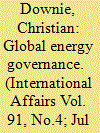

|
|
|
|
|
| Summary/Abstract |
It is widely accepted that the rising power of the BRIC countries—Brazil, Russia, India and China—has the potential to re-shape the international system. However, little attention has been given to the BRICs’ role in a growing area of strategic importance: global energy governance. While global governance scholars now argue that the international energy architecture requires substantive reform to keep pace with the rapid transformations in global energy markets, largely driven by the BRICs, it is not clear what role these countries will play in future governance arrangements. Drawing on recent scholarship in global governance and international negotiations, interviews with G20 energy officials, and the observations of the author, a past delegate to G20 negotiations, this article examines whether the BRICs as a coalition have the capacity and willingness to drive substantive global energy governance reform. In doing so, it highlights the problems with the BRICs as a coalition on energy and considers the prospects for energy reform in light of China's increasing engagement with energy governance ahead of it hosting the G20 Summit in 2016.
|
|
|
|
|
|
|
|
|
|
|
|
|
|
|
|
| 6 |
ID:
115123


|
|
|
|
|
| Publication |
2012.
|
| Summary/Abstract |
Founded in response to the 1973 oil shock, the International Energy Agency (IEA) is arguably still the most important multilateral organization for energy-importing countries. Yet, the global geopolitical landscape has changed considerably since the IEA's creation. The rise of new energy consumers, new energy-related challenges and new international energy forums prompt a rethink of the agency's current role and institutional design. This article seeks to contribute to the recent debate on the future role of the IEA by examining specific drivers, avenues and constraints for institutional reform. The method used is SWOT analysis, which allows to summarize the key factors emanating from an assessment of an organization's internal characteristics (strengths and weaknesses) and its external environment (opportunities and threats). Building on this SWOT analysis, the article formulates a strategy for the IEA to remain the focal point in global energy governance. Key elements of this strategy include: stronger engagement with new consumers, rapprochement with OPEC, becoming a leading voice in the energy transition, and changing the agency's internal governance practices.
|
|
|
|
|
|
|
|
|
|
|
|
|
|
|
|
| 7 |
ID:
107529
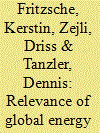

|
|
|
|
|
| Publication |
2011.
|
| Summary/Abstract |
Global climate and energy governance have led to the creation of a wide range of international and regional institutions, initiatives and financial mechanisms dedicated to fostering renewable energies. Furthermore, a low-carbon economy has evolved in recent years. The objective of this paper is to assess the potential benefits and merits of these institutions, initiatives and mechanisms from the perspective of the Middle East and North Africa (MENA) region. The central questions are if and how these organizations, initiatives and finance mechanisms could support a country from MENA in its efforts to implement large-scale capacities for renewable energy production. For this purpose, Morocco was chosen as a case study. The findings in this paper indicate that the existing institutions and financial mechanisms do not sum up to a coordinated governance approach, although the main needs of a country or region appear to be addressed. The existing institutions and financial mechanisms vary significantly in their ability to support countries, especially those taking the lead in renewable energy implementation.
|
|
|
|
|
|
|
|
|
|
|
|
|
|
|
|
| 8 |
ID:
175028
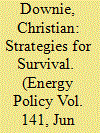

|
|
|
|
|
| Summary/Abstract |
Changes in the international balance of power, transformations in global energy markets, and the proliferation of new energy organizations have left the IEA facing a potential crisis. Traditionally scholars assume that international organizations, such as the IEA, have little autonomy to respond to changes in the international environment. While empirical studies have shown that this does not always match reality, almost no scholarship has focussed on these issues in the domain of energy. In particular, on the strategic role that international organizations can play in their own right and the impact this could have on the existing international energy architecture. This paper seeks to address this gap by focussing on the behaviour of the IEA since 2015 when it commenced a modernisation programme. Drawing on interviews with energy officials, it identifies the key pressures shaping the IEA's environment, the IEA's strategies in response, and the extent to which the IEA's has had autonomy from member states to pursue its strategies. The empirical analysis highlights that policymakers should pay greater attention to the strategic actions of organizations like the IEA and the way they can shape the contours of the energy domain.
|
|
|
|
|
|
|
|
|
|
|
|
|
|
|
|
| 9 |
ID:
096682
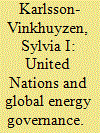

|
|
|
|
|
| Publication |
2010.
|
| Summary/Abstract |
The link between energy, economic development and national security has often made governments reluctant to address energy in global governance. In the United Nations (UN) system and beyond, the result has been almost a normative and institutional vacuum on energy. In the last decade some efforts have been made to fill this vacuum within the UN but they have faced considerable resistance, and instead initiatives have multiplied outside it. This article outlines the dynamics of the low profile of the energy issue on the agenda of the UN since the organisation's birth, analyses in more detail the efforts to strengthen this agenda in the 2000s, and also why they failed. Finally, it discusses possible future options for the UN and the international community at large to address this urgent issue, situates this discussion in the rationalist and constructivist theories of effective and legitimate global governance and outlines further research avenues.
|
|
|
|
|
|
|
|
|
|
|
|
|
|
|
|
|
|
|
|
|